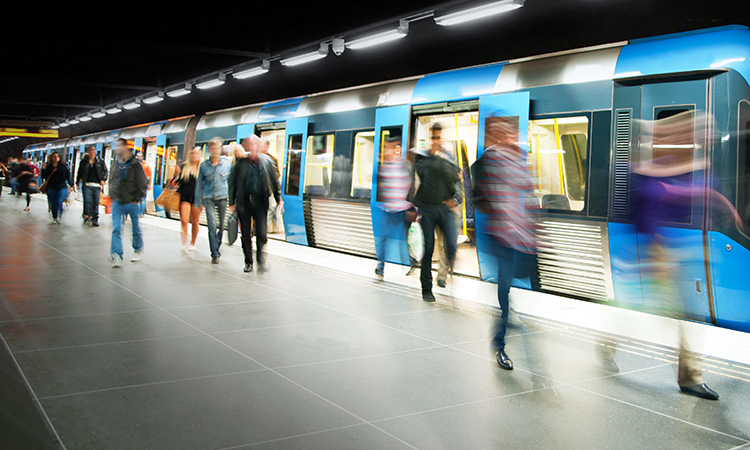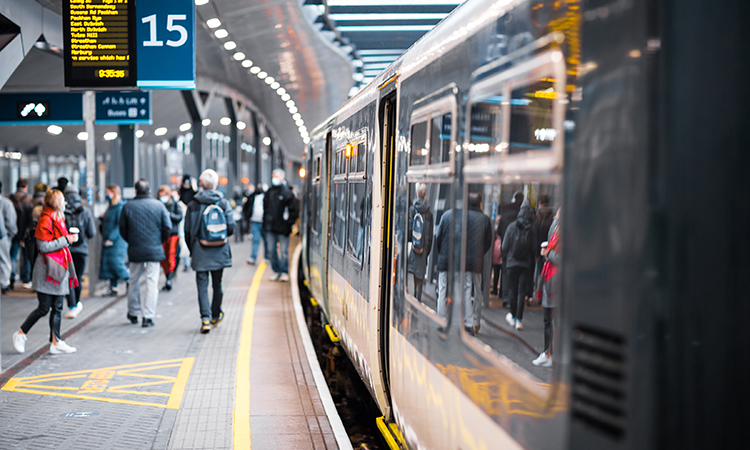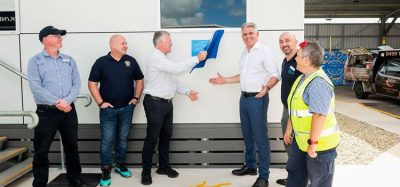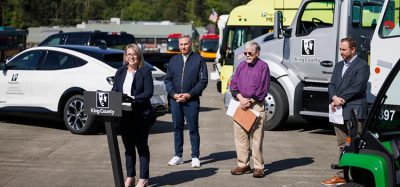Interview Spotlight: Martin Howell, Worldline, and Dr Stian Reimers, Reimers Consulting LLC
- Like
- Digg
- Del
- Tumblr
- VKontakte
- Buffer
- Love This
- Odnoklassniki
- Meneame
- Blogger
- Amazon
- Yahoo Mail
- Gmail
- AOL
- Newsvine
- HackerNews
- Evernote
- MySpace
- Mail.ru
- Viadeo
- Line
- Comments
- Yummly
- SMS
- Viber
- Telegram
- Subscribe
- Skype
- Facebook Messenger
- Kakao
- LiveJournal
- Yammer
- Edgar
- Fintel
- Mix
- Instapaper
- Copy Link
Posted: 1 August 2022 | Dr Stian Reimers - Reimers Consulting LLC, Leah Hockley - Intelligent Transport, Martin Howell - Worldline | No comments yet
Martin Howell, Director of Transport Markets – UK & Ireland for Worldline, and Dr Stian Reimers, of Reimers Consulting LLC, sat down with Intelligent Transport’s Leah Hockley to discuss changing travel behaviours and attitudes, and to share their thoughts on how the industry can innovate and reform to design services that attract more passengers to public transport.


Changing behaviours can only be implemented through a mixture of push and pull factors. In your opinion, what is the most important push or pull factor that will help to create behavioural change in public transport use?
Dr Stian Reimers: Considering the way that the mind works, it’s usually lots of different, small factors that need to be addressed in order to drive change.
Ultimately, I think that there is a high-level goal: to stop people having to think about things too much. So, the less cognitive effort that people have to put into travelling, the more readily they’ll be willing to change their behaviour towards using public transport more.
It’s that certainty, that expectations will be met, time after time, that is critical to making public transport attractive to people again”
But this will be achieved by a number of small incremental changes, such as making sure that people can get information easily; that they trust the information that they get so that they don’t have to check multiple websites; that they know that they are getting the cheapest fare; and that the service that they are intending to get is reliable so that they don’t have to make back-up plans.
Martin Howell: From my perspective, which is very similar to Stian’s, it’s about removing uncertainty – so that people know that they’re getting the best value and the best price for their travel, but also so that they can rely on their chosen mode of transport, that it’s going to be there when it says it is and that it’s going to get them to their destination.
It’s what we call the ‘time promise’, and the reason for that is that this is how the rest of their world works now: find what you want quickly, order it and be assured that it will be delivered exactly when it says it will. It’s that certainty, that expectations will be met, time after time, that is critical to making public transport attractive to people again.
Cost and accessibility are two key factors that impact people’s uptake of public transport. How do you think a MaaS solution could help to decrease these pain points for users?
Howell: I think that we’re spending too much time thinking about Mobility-as-a-Service (MaaS) as a product, when, in reality, most people have no interest in that as they don’t know what it means. What they want to know is whether or not their travel experience is going to be fully integrated, connected and seamless. That may not be apparent to people right now, but, once they experience it, they will be converted. That’s the travel experience that we need to give them.
We have created a world where, through privatisation, there is a great deal of commercial interest that means that delivering all of the components of seamless travel is harder to do, but it’s not impossible”
Talking about integrated and seamless transport is the way that we need to think about this. Mobility-as-a-Service? Good idea, but let’s not sell it as a product. And, to go back to the point of the question, how do we decrease these pain points of cost and accessibility? By delivering that seamlessness.
None of it is technically difficult. The technology has been proven for years. The problem is in the commercial factors. We have created a world where, through privatisation, there is a great deal of commercial interest that means that delivering all of the components of seamless travel is harder to do, but it’s not impossible. And, if we can join all of that up, as well as understand through data what people’s travel behaviours and aspirations are, then you can start designing services that meet that. At the moment, we don’t have all of that information, and, consequently, things are still fragmented.
Reimers: Just speaking specifically to the cost issue, clearly cost is important and people care about the absolute price that they are paying for things. But it is also about perception. Compared to monthly bills that quietly come out of someone’s bank account, regularly handing over money to get from one place to another really jumps out as a painful expense.
People need to know that they’re getting the right price for things – they need to be able to trust whatever system they’re using to be able to give them the best price for what they want to do”
We know now that paying by card or contactless reduces the pain of payment relative to cash, and people subsequently don’t feel like they’re spending quite as much; subscriptions reduce salience and pain even further. So, the easier and more thought-free it is to pay for travel, the more paying for travel will have the same lower-key status as other effort-free subscriptions to services like Netflix or Spotify.
But I think that this needs to be coupled with a second factor, which is that people also care about relative cost – we’re bad at absolutes but great at making comparisons. So, people care about whether they’ve paid more than the person next door.
I think, within the mobility and transport sectors, people need to know that they’re getting the right price for things – they need to be able to trust whatever system they’re using to be able to give them the best price for what they want to do, and that they’re not going to find out that they could have got it for half the cost if they had looked more closely. If you can establish that trust, then the cost feels fair and, often, a lot of what people think of as being excessive cost is actually about it feeling like they’re paying more than they need to for something.


Much of society is becoming increasingly motivated by environmental factors in their decision-making processes. What can public transport providers/MaaS solutions do to create a loyal and committed audience of new public transport users?
Reimers: We know from more general research that people are willing to trade off things like cost and convenience against improved environmental credentials or environmental factors. But it only goes so far. We found in our research that, when you ask people to spontaneously talk about public transport or driving, the factors that they mentioned were focused on convenience, reliability and cost. Only a few people mentioned environmental factors as a driver for them.
If you make people feel the difference between cars that are dirty and pumping out pollution, compared to the sleek, modern (and often electric) trains and buses that are the alternative, then that’s what is more likely to be motivating”
Much of this works on emotion. Most people aren’t going to be strongly motivated by calculating how much CO2 they save if they travel by train, rather than their car. It will affect some people, but not a lot of them. However, if you make people feel the difference between cars that are dirty and pumping out pollution, compared to the sleek, modern (and often electric) trains and buses that are the alternative, then that’s what is more likely to be motivating.
Howell: There is a whole generation that is growing up and making decisions about their lives based on cost – because things are going up in price for them right across the board – and on the environment.
A good example are the passengers that are happy to sit on the bus or coach for two hours longer because the journey is so much cheaper than jumping on the train. Those people could be on the train if we priced it properly, in a different way. But the pricing is so obscure, opaque and distorted for rail travel. If we’ve got to address one thing, I would say to do that first. There’s got to be total reform of the way that fares work on the railways.
Further to that point, my own experience with my adult children is that they’re environmentally minded in all sorts of ways about recycling, about social responsibility and about how organisations and big corporations behave. But I think that we could do better to take the environmental enthusiasm that they show and spread it across the rest of society by saying, “Okay, what are you actually costing the environment by the behaviours that are normalised for you right now, such as jumping in the car to go to the supermarket?” I don’t think that we’ve done enough to help people to make those decisions.
I also think that we have to show people the cost of car ownership – a depreciating asset that sits there rusting for 95 per cent of the time for most people and, particularly at the moment, costs an incredibly high amount to fuel, as well. What more impetus could we need?


MaaS solutions use customer data collection to create ‘maps’ of services and efficiently implement solutions. How can we ensure that this data is used for the benefit of customers, rather than assuming that it is going to be used exploitatively?
Howell: Worldline thinks that there should be a starting point that is completely 180 degrees from where we stand at the moment. This starting point would be that the data generated by an individual belongs to that individual. Not to the people who have harvested it, bought it or somehow else came by it.
Data generated by an individual should belong to that individual. Not to the people who have harvested it, bought it or somehow else came by it”
There was a presentation on the television show Dragon’s Den by a man called Sam Jones who founded Gener8, which is an organisation that enables people to make money out of the data that is being harvested about them. His view also is that data belongs to the individual, and one of the points that he made was about internet ‘cookies’, which are a data harvesting tool. He noted that, if you look at the list of vendors, which the website is obliged to give you access to – it may take a bit of effort, but once you find the full list of vendors that the website will be selling your information to, in some cases, it can be over a thousand companies long. That’s why we, as an industry, are in the trouble that we are in, because people are starting to realise that and think, “I don’t want to be bombarded with adverts that you think are right for me. I don’t want you to be tracking me, profiling me for purposes that have got nothing to do with the benefit of my life, but entirely to do with you making money out of me.”
People are tired of it, and that’s what we’ve got to change. That may need legislation, but I think that we should be, as an industry, sharing data responsibly. By promising that their data will only be used to improve transport networks – which is, in itself, a good end result – and it is made perfectly clear to people that this data will not be sold onto anybody else, then we avoid only ever having a high level of anonymised data and people saying, “No, I don’t want it shared.” Even though, if we did it right, they would actually benefit from sharing this data. But, at the moment, we’re not doing it right. I hope that that relationship isn’t irreparably broken, but we are standing far too close to it becoming irreparably broken – to the point that people simply assume that their data will be abused. And that’s a terrible indictment of us as a society and of greed and exploitation on the part of an industry that we’ve, somehow, got to unravel.
Reimers: With apps like Google Maps, users are usually quite happy to share their location data in order to tell other people what the traffic is like, so that Google can use that information to tell the people behind them what the best route to take is. Similarly, users benefit from what people in front of them are experiencing. If data is just being used to represent a body moving through space, rather than it being linked to the ads that users see and the price that they pay for things, I think that people are more than willing to give up that information. I think that most people are happy with this scenario, but are probably less happy about having that data linked to them and then bundled up and used more broadly.
It’s not that we’re obsessed about privacy – just take a look at how many people click the ‘Accept all cookies’ button on websites because it’s in green rather than in grey, or because it’s easy than trying to find the ‘Decline all cookies’ button, and that’s all that it takes to get people to give up their information. But I think that people are becoming more aware of this more generally now, and that is where it becomes a potential issue for the transport industry, more specifically. But, if the industry can silo the data and say to users, “We are only looking at where you move from and to, as well as some very limited demographics,” then that would be a significant change for the information that transport planners have access to and could have a massive effect on infrastructure without the individual user having to give up a lot of personal data. It’s more complex than that, of course, and there’s going to be risks related to identifying people by where they are and where they go, but that seems to be the goal.


Privatisation of public transport is often lamented as the reason for a decline in service quality and increases in fees. Is nationalising public transport (buses and trains, particularly) really the way forward?
Howell: I would say, realistically, no, probably not. The idealist in me thinks that yes, a nationally run and owned network sounds good, and you see it working well in places like France. But is nationalisation really the answer for the UK? No, I don’t think so, because I think that there would be the danger that the industry would go back to the ‘old days’ of British Rail. However, though nationalisation may not be the answer, a change is definitely needed.
Oddly, we are actually already someway down the path towards a semi-nationalised industry, in that there’s been the announcement of the end of the franchises and the creation of Great British Railways (GBR). What will Great British Railways be? We don’t really know yet. But we do know that franchises were never the answer to the industry’s problems. We definitely cannot go back to the old franchise system, as operators weren’t focused on the customer, but were instead more concerned with how they could make the maximum amount of money, based on franchise rules. This meant running empty trains, sometimes for no reason, apart from the fact that it was an obligation and to get paid, which is just unreasonable.
If we run a railway on the basis of making services fit on the available track space, without instead understanding what the customer need is, then we’re just going to be going around in circles and not get anywhere”
So, what could we, as an industry, do? The government, in the form of Great British Railways, needs to provide the framework and legislation to make the use of data more responsible. Mandate open data, so that everybody has to share it. We’re willing to do that at Worldline: use data responsibly and then let the people who know how to run these bus and rail networks just get on with it. Let’s let the industry run itself, like every other privatised industry – why should transport be any different? Also, stop focusing too much on infrastructure, and instead focus on the customer. If we run a railway on the basis of making services fit on the available track space, without instead understanding what the customer need is, then we’re just going to be going around in circles and not get anywhere.
Reimers: I don’t think the question is about whether it should be public or private, as we all have our individual ideological preferences. But, ultimately, I think that privatisation did bring fragmentation that undermined the customer experience quite significantly. Franchising resulted in different websites with different user interfaces and options, which subsequently meant that, if a user wanted to book a ticket on one rail provider’s website, it was a totally different experience from if they wanted to do it on another. People don’t want that – they like consistency, so the idea that you have to book with a particular company, or you find different information depending on which company you look for, is frustrating.
Fragmentation has also resulted in different operators not knowing what’s being offered by others. There isn’t a universal set of tickets that users can buy, but it actually differs depending on the chosen operator. People don’t know whether they’re going to be able to buy the ticket that they want, or that some operators offer options that others don’t, which can result in confusion or lead to people thinking that it would just be easier to travel by car.
There are also the broader issues, such as the rules about what is considered peak and off peak, or the risk of having to pay a fine if you purchase the wrong ticket. Ultimately, people don’t care about the specifics – to them, they’re all just trains and just buses, all of which work in the same way – they just want to be able to get from A to B in the easiest way possible at a price that is acceptable.
I think that that was the main downside of privatisation: the franchising, the fragmentation and the loss of consistency. I think that the aim now has to be, by one means or another, to bring everything back together so that people can have a consistent experience, so that they don’t have to look at different sites and not know where they get the best information from. Instead, they can either go to just one place for everything or, at the very least, they can access a similar system and have a similar experience wherever they go.




Related topics
Journey Planning, Passenger Experience, Public Transport, Ticketing & Payments, Travel & Passenger Information
Issue
Issue 2 2022
Related modes
Bus & Coach, Rail
Related countries
United Kingdom
Related organisations
Google Maps, Great British Railways (GBR), Reimers Consulting LLC, Worldline
Related people
Martin Howell, Stian Reimers








